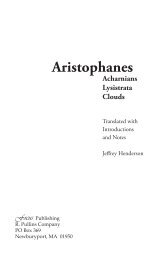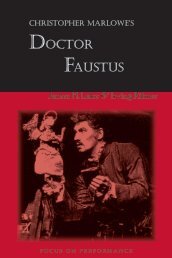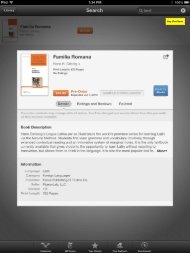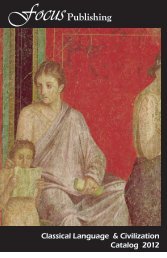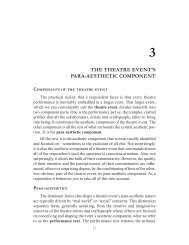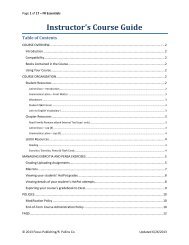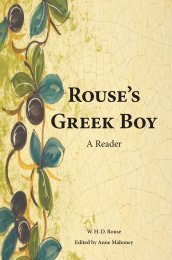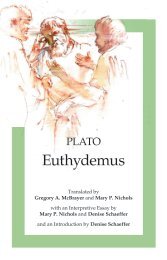ROMAN COMEDY - Focus Publishing
ROMAN COMEDY - Focus Publishing
ROMAN COMEDY - Focus Publishing
- No tags were found...
You also want an ePaper? Increase the reach of your titles
YUMPU automatically turns print PDFs into web optimized ePapers that Google loves.
F o c u s C l a s s i c a l L i b r a r yRo m a n Co m e d yFi v e Pl a y s b y Pl a u t u s a n d Te r e n c eTranslated with Introduction and NotesDavid Christenson
Roman ComedyFive Plays byPlautus and TerenceTr a nsl at ed w it hin t ro d u c t i o n a n d No t e s byDavid Christenson
The <strong>Focus</strong> Classical LibrarySeries Editors • James Clauss and Stephen EspositoAristophanes: Acharnians • Jeffrey HendersonAristophanes: The Birds • Jeffrey HendersonAristophanes: Clouds • Jeffrey HendersonAristophanes: Frogs • HendersonAristophanes: Lysistrata • Jeffrey HendersonAristophanes: Three Comedies: Acharnians, Lysistrata, Clouds • Jeffrey HendersonEuripides: The Bacchae • Stephen EspositoEuripides: Four Plays: Medea, Hippolytus, Heracles, Bacchae • Stephen Esposito, ed.Euripides: Hecuba • Robin Mitchell-BoyaskEuripides: Heracles • Michael R. HalleranEuripides: Hippolytus • Michael R. HalleranEuripides: Medea • Anthony PodleckiEuripides: The Trojan Women • Diskin ClayGolden Verses: Poetry of the Augustan Age • Paul T. AlessiGolden Prose in the Age of Augustus • Paul T. AlessiHesiod: Theogony • Richard CaldwellHesiod: Theogony & Works and Days • Stephanie NelsonThe Homeric Hymns • Susan ShelmerdineOvid: Metamorphoses • Z. Philip AmbrosePlautus: Captivi, Amphitryon, Casina, Pseudolus • David ChristensonRoman Comedy: Five Plays by Plautus and Terence • David ChristensonRoman Lives • Brian K. HarveySophocles: Antigone • Ruby BlondellSophocles: Electra • Hanna M. RoismanSophocles: King Oidipous • Ruby BlondellSophocles: Oidipous at Colonus • Ruby BlondellSophocles: Philoktetes • Seth ScheinSophocles: The Theban Plays • Ruby BlondellTerence: Brothers (Adelphoe) • Charles MercierVergil: The Aeneid • Richard CaldwellCopyright © 2010 David ChristensonCover: Theatrical masks, mosaic, Roman, from Villa Adriana, Rome, Italy. Location: MuseoCapitolino Rome. © The Art Archive / Museo Capitolino Rome / Gianni Dagli Orti.ISBN 13: 978-1-58510-319-5ISBN 10: 1-58510-319-510 9 8 7 6 5 4 3 2 1This book is published by <strong>Focus</strong> <strong>Publishing</strong> / R. Pullins Company, PO Box 369, NewburyportMA 01950. All rights are reserved. No part of this publication may be produced, stored ina retrieval system, produced on stage or otherwise performed, transmitted by any means,electronic, mechanical, by photocopying, recording, or by any other media or means withoutthe prior written permission of the publisher.If you have received this material as an examination copy free of charge, <strong>Focus</strong> <strong>Publishing</strong>/R.Pullins Company retains the title to the material and it may not be resold. Resale of anyexamination copies of <strong>Focus</strong> <strong>Publishing</strong>/R. Pullins Company materials is strictly prohibited.1109TS
Table of ContentsIntroduction.................................................................................. 1The Five Plays:Menaechmi (“The Menaechmus Brothers”).......................... 12Rudens (“The Rope”)..............................................................16Truculentus (“The Fierce One”)..............................................19Adelphoe (“The Brothers”).................................................... 26Eunuchus (“The Eunuch”).......................................................31Menaechmi..................................................................................41Rudens........................................................................................ 99Truculentus................................................................................171Adelphoe....................................................................................219Eunuchus...................................................................................273Appendix I: Olympian Deities Mentioned in the Five Plays.....335Appendix II: Currency Referred to in the Five Plays...............337Appendix III: Correspondence between the Scene NumbersUsed in the Five Plays and the Renaissance Act & SceneNumbers ...................................................................................339v
IntroductionPlautus (ca 254-184 BCE) and Terence (fl. 166-60 BCE) are enormouslyimportant figures in western comedy. As Rome began to establish its hegemony overthe ancient Mediterranean basin, these two popular comic poets entertained Romanaudiences in successive generations. Latin literature was still in its formative years,and Rome was in an early stage of becoming a cosmopolitan city. Plautus’ playscontinued to be performed for centuries after his death. Revivals of Terence’s playswere less common, though their survival was ensured by their central position inthe educational curriculum, thanks to the simple elegance of Terence’s Latin and hisplays’ perceived morally upright content. Plautus’ more boisterous comedies, despitetheir linguistic extravagances and their portrayals of dubious morality, likewisesurvived through continuous copying down to the Renaissance, where they enjoyed agreat revival of interest. The works of Plautus and Terence went on to influence scoresof dramatists in the European tradition, including such luminaries as Shakespeareand Molière. The extremely successful Broadway musical and film A Funny ThingHappened on the Way to the Forum is a pastiche of several Plautine plays, and theentire television sit-com genre is much indebted to the tradition of Greek and RomanNew Comedy as it is represented chiefly by Plautus and Terence. 1The five plays translated here provide a representative sample of the rich andvaried comedy in Latin that delighted audiences in Rome during the culturallytumultuous first half of the 2 nd century BCE.The World(s) of Plautus and TerenceLatin literature begins in 240 BCE, when Livius Andronicus produced a comedyand a tragedy translated from Greek at a religious festival (Ludi Romani) in honorof the god Jupiter. In the 3 rd century BCE, the Romans had seized control of Italy,and they had begun to set their sights beyond the Italian peninsula. The first phaseof this process that eventually led to Roman domination throughout Europe andbeyond was conflict with Carthage, a powerful Phoenician colony and trade centerlocated in what is now Tunisia. The First Punic War (261-241 BCE) ended in a Romanvictory over the Carthaginians. Many citizen-soldiers had been exposed to Greekstyledrama while on campaign in southern Italy, and it is no coincidence that Livius,said to be a freed slave from the Greek colony of Tarentum (now Taranto) there,staged his plays in Rome in the year following the war’s end. The Carthaginians,under Hannibal’s leadership, were soundly defeated in the Second Punic War (218-1 See further Grote (1983).1
2 Ro m a n Co m e d y201 BCE). The protracted wars with Carthage also brought the Romans into conflictwith various kings and city-states of Greece. A series of wars with the Macedonians,the remnants of Alexander the Great (d. 323 BCE) and his short-lived, now fracturedempire, ended with a Roman victory at Pydna on the northeast coast of Greece in 168BCE. This decisive battle effectively negated the possibility of a Greek resurgencein Mediterranean politics, and signaled a new phase in the Roman appropriation ofGreek culture. These wars with the Carthaginians and the Greeks finally came to aconclusion with the destruction of Carthage and the sack of Corinth (marking thefinal relegation of Greece to a Roman province) in 146 BCE. During this period ofmilitary expansionism, Roman generals competed fiercely with each other for publicacclaim and the cherished right (granted by the senate) to celebrate a formal triumphin Rome. Roman playwrights had inherited the stock figure of the braggart soldierfrom Greek comedy, but characters such as Stratophanes in Plautus’ Truculentusand Thraso in Terence’s Eunuchus perhaps also resonated with Roman audiences asgrotesque parodies of these ambitious, celebrity-seeking aristocrats.The plays of Plautus and Terence thus were produced during a dynamic periodof the Roman Republic. Rome at the peak of both Plautus’ and Terence’s careers wasexperiencing a major cultural revolution. Soldiers stationed abroad and other Romantravelers had fallen under the spell of Greece, and many had learned Greek. Greekculture was now exerting enormous influence on Roman life, and Greek philosophers,rhetoricians, artists, poets and teachers were ubiquitous in the city. The years ca 240-160 BCE in fact mark the first major epoch of Latin literature. While the Romans’literature essentially was a derivative product and so always a kind of homage to theGreeks, it also proved to be a forum in which they would increasingly assert their owncultural and national identity.The process of establishing a distinctly Latin literature thus unfolded in the midstof considerable cultural upheaval. The successful wars with Carthage and her allieshad introduced unprecedented new wealth to Rome, an influx of foreigners, and manyexotic new customs. Though there was much demand in Rome for (esp.) things Greek,there was also a conservative backlash. Moral traditionalists such as Cato the Elder(239-149 BCE) publicly railed against the decadence and dangerousness they saw inthe new wave of outside influences, while also sometimes enjoying aspects of it intheir private lives. In particular, conservatives depicted the infusion of Greek cultureas a serious threat to the traditional homogeneity of Roman institutions, and to thenational character itself, which they idealized as rooted in such values as practicality,perseverance, frugality and parsimony. The Greek cultural invasion nonetheless rolledon in Rome, though with considerable tension. The introduction of the eastern cult ofthe god Bacchus (= Greek Dionysus), for example, resulted in major scandal, and byan emergency decree in 186 BCE, the senate declared it a threat to public moralityand order. In 161 BCE, Greek rhetoricians were universally banished from Rome.But even the most traditionalist members of the elite ranks of society graduallysaw the utility in creating a national literature to rival that of the Greeks as a meansof enhancing Roman prestige in the Mediterranean world. Drama received generousstate-sponsorship in Rome, and it flourished in this period. After all, the Greek source
In t r o d u c t i o n 3plays that playwrights such as Plautus and Terence adapted for the Roman stage camewith a built-in “safety-net:” all were set in Greece (usually Athens) or some other non-Roman locale (e.g., North Africa in the case of Plautus’ Rudens), and so their shadycharacters and depictions of immoral action could be dismissed as foreign imports.But both comic playwrights—Plautus to a much greater extent than Terence—Romanized their plays by mixing in distinct references to Roman institutions,customs, laws, public officials, the geography and topography of Italy and Rome, andto contemporary events and issues. Far from being purely escapist entertainments,the comedies of Plautus and Terence engage directly with the ongoing 2 nd centuryBCE culture wars. As the five plays in this volume collectively demonstrate, complexcontemporary issues such as the effect of wealth upon morality, the possibilities forsocial mobility/rebirth, the integrity of the family, personal and group identity, gender,sexuality and otherness figure prominently in the comic drama of this period. Thecomedies of Plautus and Terence brought the Roman populace together to participatein what amounted to a dramatic evaluation of the cultural process unfolding outsidethe theater.The Tradition of Ancient ComedyThe extant comedies of Plautus and Terence are based on plays belonging to thegenre of New Comedy, which flourished in Greece from ca 325 to 250 BCE. This wasthe third phase of Greek comedy after Old Comedy, which is now represented primarilyby the bawdy, fantastical, and quintessentially Athenian plays of Aristophanes thatwere originally performed in the late 5 th and early 4 th centuries BCE. Middle Comedy,which survives only in fragments (mostly dating to the 4 th century) and through titlesof plays, marks the period of transition to the better-attested New Comedy. GreekNew Comedy no longer focused so squarely on contemporary Athenian politics andthe prominent individuals involved in them, but was cosmopolitan and featured moreuniversal themes and plots. It depicted the more mundane social lives of upper- andupper-middle class families in Athens (or in reality any Hellenistic urban center).New Comedy did away with the pervasive obscenity, elaborate costumes, exuberantmusic and choruses, and the satire and personal invective that had defined Greek OldComedy. Comedies became more domestic than political, and were now built aroundstock characters such as clever slaves, greedy pimps and prostitutes, parasites, youngmen hopelessly in love, saucy cooks, and egotistical soldiers.The only plays of Greek New Comedy whose remains are substantial are thoseof Menander (ca 344/3-292/1 BCE). The extant plays—or parts of plays, as no singleplay survives wholly intact—consist of five-acts, and feature stereotypical and oftenhighly coincidental situations involving, e.g., the reunion of children separated atbirth with their families. Despite the unrealistic character of his plots, already inantiquity Menander was praised for his subtlety in capturing human psychology andrealistically depicting the complexities of social life; the ancient scholar Aristophanesof Byzantium (ca 257-180 BCE) is said to have exclaimed: “O Menander and Life,which of you imitated the other?” Menander’s plays are very much in keeping with
4 Ro m a n Co m e d ythe still predominant modern trend toward theatrical realism or naturalism. Menanderprovided the source plays for Terence’s Adelphoe and Eunuchus.Menander died well before the beginnings of Roman drama in 240 BCE. But hisplays and those of other New Comedy playwrights such as Diphilus (b. ca 360-350BCE), who provided the source play for Plautus’ Rudens, enjoyed frequent revivalsin Athens. They were also performed throughout the Hellenistic world by itinerantacting companies such as the famed “Artists of Dionysus.” Parts of southern Italy andSicily, though under Roman control, had been colonized by Greeks centuries earlier,and the earliest Roman playwrights, such as Livius Andronicus, were probablyexposed to Greek comedy there. Though the genre they created came to be known asthe fabula palliata, or “play in Greek costume,” Roman playwrights did not slavishly“translate” Greek New Comedy, but, rather, adapted it for the Roman stage and fortheir Roman audiences. The extant fragments of the earliest Roman playwrights, forinstance, reveal the addition of musically elaborate songs, or cantica, which do notcorrespond to anything in Greek New Comedy.Native forms of Italian comedy 2 were also instrumental in this process that is bestdescribed as creative adaptation, and seem to have had a major influence on Plautus.These forms of popular Italian drama were unscripted in Plautus’ and Terence’s day,and so we only know of them through later testimony or the fragments of much laterscripted versions. One popular form of comedy was Atellan farce, so named becauseof its origin in Atella in Campania. These performances were short, largely improvisedskits involving masked, stock characters such as Bucco (“Fool”), Maccus (“Clown”),Manducus (“Chomper-Man”), and Pappus (“Grandpappy”). There were certainfixed routines and situations, which were probably full of slapstick and vaudevillelikecomic banter, traces of which are not infrequently found in Plautus. Mime wasanother form of popular Roman entertainment, also unscripted in the early period,and nothing like mime today. Mime actors and actresses (a rare example of the use offemale performers in European theater before relatively recent modern times) had areputation for bawdiness. They were nicknamed “flat-foots” because they performedbarefoot. The actors’ costumes sported large phalli and the actresses sometimesappeared in the nude. Mime troupes likewise performed stock scenes calling forimprovisation, and they seemed to have favored short, bawdy skits, including thosefeaturing adultery. Another form of highly farcical comedy called phlyax drama,which survives primarily through 4 th century BCE depictions of scenes on vases,flourished in southern Italy. Mythical burlesques, especially plays featuring the figureof Herakles/Hercules, seem to have been very popular in phlyax drama. 3Roman TheaterRoman plays were primarily performed in connection with state-sponsoredreligious festivals, and, like the other entertainments that took place in this festivalcontext, were referred to as ludi (“games”). They were also sometimes performed in2 For these, see further Panayotakis (2005b).3 For the phlyax plays, see further Bieber (1961): 129-46.
In t r o d u c t i o n 5connection with funeral games (ludi funebres), grand public occasions to acknowledgethe life and death of a distinguished Roman aristocrat, such as those put on by thesons of Lucius Aemilius Paullus in 160 BCE, at which Terence’s Adelphoe debuted. Inthe early period of Roman theater, festivals associated with drama were held in honorof the gods Jupiter, Apollo, Ceres, Flora (an Italian goddess of flowers/flowering), andthe Magna Mater (“The Great Mother”), an Anatolian fertility goddess introduced toRoman cult in 204 BCE. The temple of the Magna Mater on the Palatine Hill was thesetting for the performance of Terence’s Eunuchus in 161 BCE.The festivals featured grand processions, the sacrifice of animals, and publicfeasts. Various events and sideshows took place during them, e.g., boxing matchesand gladiator contests. 4 The plays were performed either in the Roman forum, a circus(the venue for chariot racing), or in front of a god’s temple. State funds allocated bythe elite Roman senate financed the festivals. It was the direct responsibility of Romanmagistrates called aediles to administer the festivals and oversee the entertainmentsthat took place during them. As this Republican magistracy was held by ambitiouspoliticians, the aediles also contributed some of their private funds to finance specialentertainments for the ludi as a means of cultivating political support from the Romanpopulace. As the festivals approached, their specific duties included contracting forplays with producers, playwrights and acting troupes. The male actors that made upthese troupes typically were slaves or free persons of low status, such as freedman(i.e., former slaves). It was considered disgraceful for a freeborn citizen to perform asan actor, and one who did normally forfeited his citizen’s rights.Though the Romans possessed the architectural expertise to build grand stonetheaters after the manner of the Greeks, no permanent theater was constructed inRome until Pompey the Great’s in 55 BCE. Later writers moralized that the senatorialelite regarded the theater as a locus of decadence with the potential to fomentcivic unrest, and so had fiercely resisted all attempts to build permanent theaters.Pompey crowned his theater with a temple of Venus (Victrix), probably to justify theunprecedented structure by continuing the tradition of dramatic performances beforea temple, and so also drama’s religious associations. A more practical explanationfor the ban on stone theaters is that the senate and the ambitious sponsors of theludi viewed the construction of temporary structures for each festival as a visiblereminder to the Roman people that the ludi depended on their personal munificence;they took great pains to advertise their public benefactions through inscriptions andother public notices.Consequently, nothing survives of the theaters in which Plautus’ and Terence’splays were performed. There is little written testimony as to the nature of thesetemporary theaters and no contemporary visual evidence, and so we mostly rely onthe plays themselves to reconstruct only a general layout. The stage was a simpleplatform (proscaenium). The action there usually takes place on what is supposed tobe a street in front of a wooden backdrop (scaena) with up to three doors, which can4 For a glimpse into the full festive atmosphere, see the prologues of Terence’s Hecyra (“The Mother-inlaw”).
Menaechmi(“The Menaechmus Brothers”)CHARACTERS WITH SPEAKING PARTSPENICULUS, a parasite, i.e., a glutton and professional dinner-guestMENAECHMUS I, lost twin of Menaechmus II, currently living in EpidamnusEROTIUM, a prostitute/brothel owner who lives next door to Menaechmus ICYLINDRUS, a cook and slave of ErotiumMENAECHMUS II, Syracusan twin of Menaechmus I, originally namedSosiclesMESSENIO, slave of Menaechmus IIMAID, a slave (i.e., “maidservant”) of ErotiumMATRONA, the unnamed wife of Menaechmus ISENEX, unnamed elderly father of Menaechmus I’s wifeDOCTOR, an unnamed doctor of EpidamnusSLAVE, one of the unnamed slaves of Senex brought on to take Menaechmus tothe DoctorSCENEEpidamnus: the action takes place in front of the houses of Menaechmus Iand Erotium. One stage wing leads to the forum/ city-center, the other to theharbor.PROLOGUE 1Greetings, spectators! First and foremost I’m here to announceThat Safety 2 herself is smiling on both you and me.I’m also here to present Plautus 3 to you—with my voice, not my hands, that is!I only ask that you and your ears be kind to this play and give it a fair hearing.Pay careful attention now and I’ll provide all the details of the plot 51 The Roman comic playwrights introduced the use of an impersonal prologist (perhaps the head of theacting troupe) to ancient comedy to speak on behalf of the play and playwright.2 Many personified abstractions were worshipped in Roman religion. There were temples and shrines ofthe personified deity Salus, “Salvation” or “Safety” (especially in relation to the welfare of the state), inRome and elsewhere.3 For the life and career of Plautus, see Introduction pp. 7-9.41
42 Ro m a n Co m e d yIn as few words as a prologist possibly can.Comic playwrights have this habit of pretendingThat everything on stage is taking place at Athens. 4Why? So you think it’s in Greece, not Rome.Me? I won’t pretend it takes place anywhere except where it happened. 10Yes indeed, this play will have a genuinely Greek atmosphere,Though it’s really more of a Sicilian air than the aura of Athens about it. 5Well, that’s the prologue to my prologue.Time for me to shovel out the entire plot of this play to you(Okay, it’s really more like a barn-load than a shovel-full): 15I’m so generous when it comes to giving away the story! 6Now there was an old merchant from Syracuse 7Who had a couple of kids, twin boys in fact.They looked so much alike that the woman who breast-fed them,Their own wet-nurse, couldn’t tell them apart, 20And neither could the woman who gave birth to them, their own mother!At least that’s what somebody who saw them told me.So don’t go supposing that I saw them myself. 8Now when the boys were seven years old,Their father loaded up a ship with a load of goods. 25He took one of the twin boys onboard with him,And set off for Tarentum 9 to conduct his business.The other boy stayed home with his mother.It just so happened that there was a festival going on in Tarentum,And like at any festival, flocks of folks assembled. 30The boy wandered off from his father and into the crowd.A merchant from Epidamnus 10 was celebrating there,And he grabbed the boy and carried him off to his home.Now the unlucky loss of the ladSent his father into a funk so deep and deadly 35That the old merchant died just a few days afterwards right there in Tarentum.News of what happened reached the boys’ grandfather back in Syracuse.When he learned of the death4 Athens is the nominal setting for the majority of extant comedies, but Plautus’ Athens is a jumble ofRoman and Greek places, persons, and institutions. See Introduction p. 3.5 Plautus coins new words here, perhaps to suggest that the play will feature a more farcical Sicilianbrand of humor (sicilicissitare) rather than that associated with the relatively “high-brow” New Comedyof Athens (atticissare).6 A reference to the Roman practice of publicly distributing grain underlies the prologist’s humor here.7 The chief city of Sicily and one of the great cities of classical antiquity. Cf. n. 52 below.8 Ancient narrators are often careful to distinguish events they have only heard about from others withthose they have personally observed (i.e., by “autopsy”).9 The modern city of Taranto (in southern Italy), colonized by Spartans in the 8 th century BCE.10 A Greek colony and important trade center on the Adriatic Sea, now part of Albania.
Me n a e c h m i 43Of his son and the theft of his grandson,He decided to change the name of the other twin 40Because he loved the grandson he’d lost so much.This is how the twin who’d stayed at homeCame to be named “Menaechmus,” 11The name of his abducted brother and the name of the grandfather too. 12How do I know this? 13 Simple: I distinctly remember hearing the name 45Shouted over and over again—by debt-collectors! 14Got it? Just so there’s no confusion later, I repeat:BOTH BROTHERS HAVE THE SAME NAME.Now I must measure my way back to Epidamnus on foot, 15To explain all of this to you down to the very last detail. 50If any one of you wants some damned business of yours done there, 16 speak up now.There’s no need to fear as long as I’m taken care of—With cash up front, that is!No cash, you say? Well, you’re screwed.Have the cash for me? See you later, then—and screw you! 55So let me go back to where I started, that is, right where I’m standing.Now back to that Epidamnian I started to talk about,The guy who snatched the one twin.The only fruits of his loins were his assets,So he adopted the kid he’d kidnapped, 60Found him a wife endowed with a dowry, 17And had the decency to die and make him his heir. 18Seems he happened to go out to the country after a big rain11 The lead characters in this doubles comedy are cleverly named after a 4 th century BCE Syracusanmathematician and geometer who solved the problem of “doubling the cube.” The name may very wellbe Plautus’ invention; where direct comparison with Greek source plays is available, Plautus jazzes upthe names of the Greek characters. Cf. Introduction p. 7.12 Naming the child after the grandfather was the usual Greek practice.13 For autopsy in narration, see n. 8 above.14 A reference to the ancient Italian practice (flagitatio) of publicly shaming a debtor into payment.15 Latin verse (such as Plautus’ here) is measured in metrical feet, and so there is a metapoetic pun here.For the prologist’s emphasis on the arbitrariness and fictionality of the setting, see 72-76. Cf. alsoTruculentus 1-11 and Introduction p. 25.16 The prologist plays on Epidamnum (= accusative case of Epidamnus in Latin) here, as if it were ahybrid of the Greek preposition epi (“to,” “toward” + accusative case) and Latin damnum (“financialloss”). The bilingual pun and the idea that Epidamnus harbors con-artists who doom visitors tofinancial catastrophe is even more explicit in Messenio’s warning to Menaechmus II at 257-64.17 Under Roman marriage law, a dowry remained a husband’s property only as long as the marriagelasted. Thus, a woman whose husband had squandered her dowry might gain the upper-hand in themarriage—such a situation at any rate is the basis for the Roman comic stereotype of the “doweredwife” (uxor dotata), who in comedy is unsympathetically portrayed as a “shrew” at war with herhusband and his pursuit of pleasure.18 Under Roman inheritance law, an adopted child who was not recognized as a Roman citizen couldinherit property; the same was not true in ancient Athens.
44 Ro m a n Co m e d yAnd tried to cross a raging river not far from town.The river snatched up the boy-snatcher’s feet, 65And escorted the creep off on a one-way trip to hell.His adopted son nets his net-worth—That is, the kidnapped twin who lives right over there.Now the twin who lives in SyracuseWill arrive in Epidamnus today with his slave, 70In search of his long-lost identical twin.While this play is being staged, this city’s going to be Epidamnus;When it’s time to stage another play, it’ll be another town.The same thing happens with houses and households:One minute a pimp lives here, another minute a young man does, 75Or an old man, a pauper, a beggar, a king, a parasite, a fortune-teller … 19SCENE 1Peniculus enters from the wing leading to the forum/city-center.Peniculus 20The young men have nicknamed me PeniculusBecause I always wipe the dinner table clean.To my way of thinking, it’s extremely foolishTo put prisoners of war in chains 80Or to bind up runaway slaves in shackles.How so? If you double an unfortunate fellow’s trouble,You’ll just make him all the hungrier to act up and cut out.They’ll always find a way to remove their chains.Fetter them and they file away a link, 85Or take a rock to the lock and flee. Waste of time!Why, what’s the right and proper way to keep a man from fleeing?Why, chains of food and drink of course!Let him clamp his jaws down on a full table,Keep serving him his favorite edibles and potables each and every day, 90And you’ll wear him down with satisfaction.He’ll never escape, not even if he’s facing capital punishment.It’s really that simple. There’s no stronger chainThan the food-chain: the looser you let it out,The tighter it ties a criminal down. 9519 Stock characters from both comic and serious drama: the pimp (leno), the typically lovesick young man(adulescens), old man (senex) and parasite (parasitus) belong to New Comedy; the pauper (pauper),beggar (mendicus) and king (rex) to tragedy. The prologist describes a markedly theatrical world.20 As Peniculus is a diminutive form of Latin penis (“tail,” “penis”), the audience probably expects asexual joke to follow (the parasite Ergasilus makes a strikingly similar entrance at Plautus, Captivi69, where he asserts that the young men call him scortum, i.e., “whore”). Instead, in 78 he relates hisnickname to the word peniculus meaning “brush” or “sponge.” Cf. 286 and 391.
Me n a e c h m i 45Case in point: myself. I’m off to Menaechmus’ house here,Where I’ve been a prisoner for years. Bring on the chains, yum, yum!He doesn’t just feed you, he treats you like you’re family,He refreshes you with refreshments! There’s no sweeter medicine in the world!That’s the type of young man he is. He serves feasts fit for Ceres, 21 100His helpings are huge, veritable mountains of food!He concocts culinary monuments so lofty,You have to stand on your couch 22 to trim a tasty morsel off the summit!But there’s been quite a hiatus since I last ate here,And I’ve been resigned to dine at home with my precious little ones. 105I’m the kind of consumer who consumes only what’s precious;Problem is, I have precious little left at home to consume.So it’s time to pay him a visit. Ah, the door’s opening.Look, there’s Menaechmus coming out right now!SCENE 2Menaechmus enters from his house, yelling back at his wife inside.(SONG through 134)Menachmus I 23If you weren’t so nasty, stupid, bitchy and just plain nuts, 110You’d pick your likes and dislikes with an eye to pleasing me—your husband!If after today you keep treating me this way, I guaranteeI’ll see you’re escorted straight out of this house and home to Daddy. 24Every time I step out of the house, you’re in my face with impositions and inquisitions:“Where are you going?” “What are you doing?” “What business do you have?”“What are you up to?” “What’s that you’ve got?” “What were you doing?” 116I have to declare every little thing I’ve done or am doing:It’s like I brought a customs officer into my house, not a wife!It’s clear I’ve spoiled you, so here’s the new program:Seeing as I lavish you with personal slaves, household provisions, 120Wool, a wardrobe, cash, and fancy accessories, the smart thing for you to doIs to stop spying on your husband. So get with it now!And do you know what? To reward you for all your spying,I’ll be having dinner out today—with my favorite whore!21 For the goddess Ceres, see Appendix I p. 335. In addition to the fact that Ceres is the goddess of grain(= food by metonymy), the joke here turns on the conception of the anthropomorphic Greek and Romangods as living their lives on an exaggeratedly human scale.22 Greeks and Romans usually ate while reclining on couches with trays of food and drink placed beforethem.23 For the meaning of the name Menaechmus, see n. 11 above.24 Roman marriages could be easily dissolved (in some cases at the initiative of the woman) by a merespeech-act followed by an appropriate division of property.





